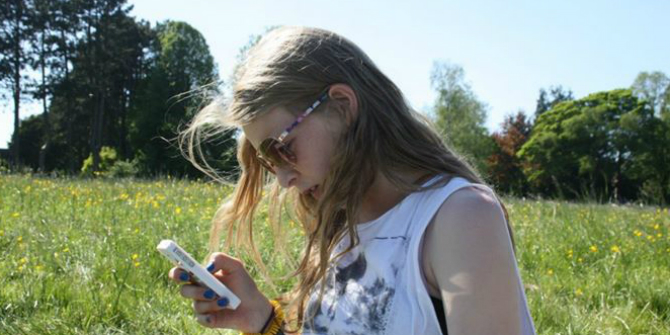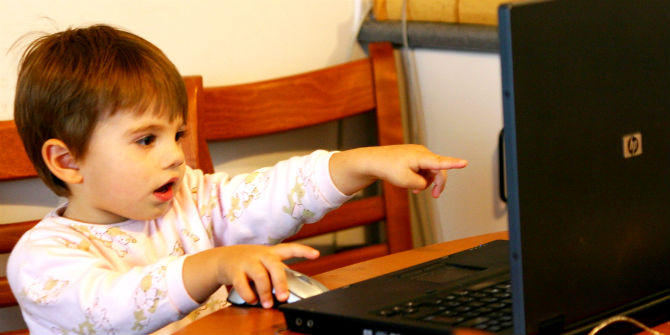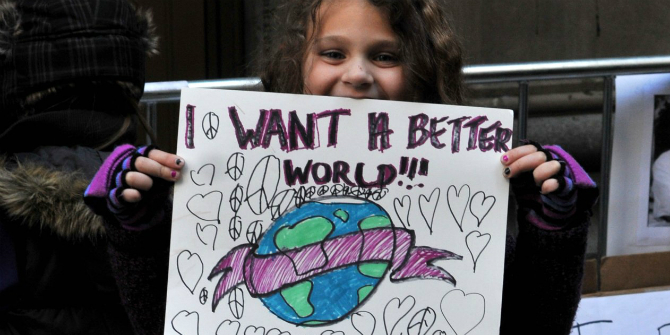In this post, Stacey Steinberg explores her own personal conflicts around ‘sharenting’. Social media enable parents to share their parenting experiences, with their children’s rights to privacy often overlooked. Here, she discusses the tensions and problems it creates, as well as some proposed policy suggestions and a recommendation for a public health model. Stacey is a legal skills professor at the University of Florida, where she also serves as an associate director for the Center on Children and Families. She is a photographer, and she writes about her family, law and culture as a contributor to On Parenting from The Washington Post. [Header image credit: A. Caligaris, CC BY-NC 2.0]
Parents are the gatekeepers of their children’s personal information, deciding what should be kept private and what should be shared with the outside world. A unique conflict exists, however, when it is the parents who want to disclose personal information about their own children, and engage in ‘sharenting’.
I am a legal scholar, photographer, former child abuse prosecutor and mother. I decided to research sharenting because I’ve struggled to find a balance between my right to share and my child’s right to privacy. This has resulted in ‘Sharenting: Children’s privacy in the age of social media’, and, with Dr Bahareh Keith, an article titled ‘Parental sharing on the internet: Child privacy in the age of social media and the pediatrician’s role, addressing the practitioner’s role in helping parents navigate appropriate social media sharing.
Creating tensions
A parent’s decision to ‘sharent‘ creates a tension that has been poorly addressed for a number of reasons. First, it is a brand new issue. The first children to grow up during the age of social media are just now entering their pre-teen years. Second, social media offers families many positive benefits, including giving a voice to parents as they struggle through difficult parenting experiences, and as they express their joys as their family lives unfold. Online sharing has many benefits, such as building communities, advocating for children’s issues and connecting with friends and family around the globe. As a parent and photographer myself, I often share on social media for precisely these reasons. But as I’ve worked through these issues, I’ve found it difficult to balance the competing issues involved, and so I’m attempting to create a framework that protects children while still valuing parental autonomy.
Appropriate sharenting
There is no consensus on what is appropriate to sharent. My research suggests that while the law could regulate at the margins, parents are best suited to decide for themselves how best to balance their children’s privacy with their interest in sharing their stories. However, even the most well-intentioned parents lack the necessary guidance to make informed decisions about online sharing. Many don’t recognise the inherent conflict that sharenting creates. Children may not agree with a parent’s decision to share any personal information (whether negative or positive) about them in the online world, with no ‘opt-out’ link for children; split-second decisions made by their parents will result in indelible digital footprints. While adults can set their own parameters, children are not afforded such control over their digital footprint.
The Right to Be Forgotten
My article on sharenting introduces a few potential legal remedies available for these children. One has its roots in the Right to Be Forgotten and its application to online disclosures in the EU, and found its genesis in Professor Livingstone’s work. I address the Right to Be Forgotten from a child-centred perspective, recognising that there would likely be legal challenges to this argument.
In the EU’s Right to Be Forgotten decision, the court recognised that as time passes, the value of information placed in the public domain may lose its value and relevance to society. If, and when, this occurs, the court held that individuals have a limited right to have the information ‘forgotten’ from digital spaces. While this case generally has limited applicability in countries, like the US, that have strong free speech, perhaps in the context of online disclosures about children, courts might allow . Ideally, children wishing to reclaim their digital footprint could have a right to have the information shared by parents during childhood ‘forgotten’ and removed from their search results on search engines such as Google. Data may be allowed to remain on the internet, but in the few instances where a child no longer wished to be associated with the content, it could give them a right to request the link be, in effect, broken.
As the expressive purpose of the parent’s disclosure diminishes as the child ages, the value of the disclosure is minimised and must make way to the competing privacy interests of the child.
Proposing a public health model
Despite the potential legal remedies available to children who oppose their parents’ decision to share online, my work proposes that while a legal model is helpful, a public health model, centred on educating parents as to the inherent conflict at the heart of sharenting, is essential to accomplish real change. Indeed, parents often intrude on a child’s digital identity not because they are malicious, but because they simply have not yet considered its importance.
A public health model would offer child-centred solutions that give parents the autonomy to control the upbringing of their children while simultaneously respecting the privacy of the individual child within the family unit.
Our recommendations include encouraging parents to:
- Learn about the privacy policies of the sites on which they share.
- Receive notifications for programs like Google Alert to tell them when their child’s name appears on websites.
- Consider sharing about without using their child’s identity.
- Avoid sharing a child’s location or personal information with large audiences.
- Allow older children to ‘veto’ a parent’s suggested online disclosures.
- Keep children clothed in all photos.
- Always keep in mind how a child would feel if they one day come face to face with the online disclosure.
There are many benefits to online sharing, and informed parents can continue to reap these benefits while also protecting their children’s privacy interests online. By educating parents of the potential privacy issues and safety risks posed by online sharing, children’s rights experts should be able to shift society’s discourse on this important topic.
This post gives the views of the authors and does not represent the position of the LSE Parenting for a Digital Future blog, nor of the London School of Economics and Political Science.





